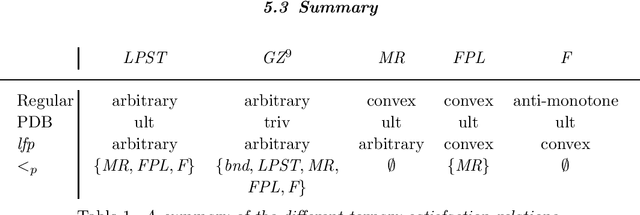Linde Vanbesien
An epistemic logic for modeling decisions in the context of incomplete knowledge
Dec 18, 2023Abstract:Substantial efforts have been made in developing various Decision Modeling formalisms, both from industry and academia. A challenging problem is that of expressing decision knowledge in the context of incomplete knowledge. In such contexts, decisions depend on what is known or not known. We argue that none of the existing formalisms for modeling decisions are capable of correctly capturing the epistemic nature of such decisions, inevitably causing issues in situations of uncertainty. This paper presents a new language for modeling decisions with incomplete knowledge. It combines three principles: stratification, autoepistemic logic, and definitions. A knowledge base in this language is a hierarchy of epistemic theories, where each component theory may epistemically reason on the knowledge in lower theories, and decisions are made using definitions with epistemic conditions.
Analyzing Semantics of Aggregate Answer Set Programming Using Approximation Fixpoint Theory
Apr 30, 2021
Abstract:Aggregates provide a concise way to express complex knowledge. While they are easily understood by humans, formalizing aggregates for answer set programming (ASP) has proven to be challenging . The literature offers many approaches that are not always compatible. One of these approaches, based on Approximation Fixpoint Theory (AFT), has been developed in a logic programming context and has not found much resonance in the ASP-community. In this paper we revisit this work. We introduce the abstract notion of a ternary satisfaction relation and define stable semantics in terms of it. We show that ternary satisfaction relations bridge the gap between the standard Gelfond-Lifschitz reduct, and stable semantics as defined in the framework of AFT. We analyse the properties of ternary satisfaction relations for handling aggregates in ASP programs. Finally, we show how different methods for handling aggregates taken from the literature can be described in the framework and we study the corresponding ternary satisfaction relations.
 Add to Chrome
Add to Chrome Add to Firefox
Add to Firefox Add to Edge
Add to Edge